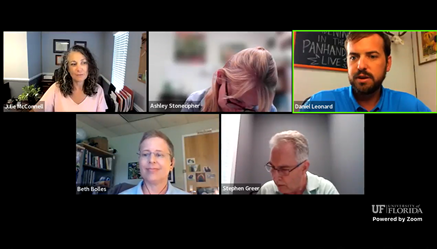The Q&A on Native Pollinators and their Favorite Flowers offered valuable information on many types of flowers that feed our many species of pollinators in Northwest FL. Below are the reference materials related to specific questions that were asked along with notes from the panel discussions.
- Concepts for Sustainable Landscape Mosaics https://edis.ifas.ufl.edu/pdf/EP/EP605/EP605-Dfg811ah9y.pdf
- Stephen Greer was asked which garden perennials are best for pollinators, he mentioned that Blanketflower, Cardinal Flower, Black Eyed Susan were his top three.
- Julie McConnell was asked, what are some shrubs to benefit birds and pollinators? She stated that insects forage off lawn grasses, but good shrubs are Wax Myrtle, Saw Palmetto, American Beautyberry, Vibernum and Holly Species. Sandy Soil Pollinators: Firebush, Holly, Saw Palmetto, all drought tolerant and good for pollinators.
- Bird Friendly Plants – https://gardeningsolutions.ifas.ufl.edu/design/gardening-with-wildlife/bird-friendly-plants.html
- Julie McConnell was asked about Fall Pollinator Plants, replying Swamp Sunflower as her favorite.
- Panhandle: Fall Wildflowers https://nwdistrict.ifas.ufl.edu/hort/2020/10/07/panhandle-fall-wildflowers/
- Julie says she also recommends Firespike, Goldenrod, Cardinal Flower, Saltbush,
- What about Winter Pollinator Plants?
- Winter: Mahonia, Fatsia, both good plants for pollinators in shady areas, also Beth added that winter vegetables help pollinators in the winter, such as carrot, wild radish, provide forage for bees, bumblebees and plasterer bees, carpenter bees. Matt Lollar said daikon radish is another good pollinator plant for fall and winter.
- Question from Facebook: Are Loquat trees good for pollinators. How large do they get and when do they bloom? Do they need shade or full sun?
- Growing Loquat in the Home Landscape: https://edis.ifas.ufl.edu/pdf/MG/MG05000.pdf\
- Are Spicebushes good Pollinator Plants?
- FPS-345/FP345: Lindera benzoin Spicebush https://edis.ifas.ufl.edu/publication/FP345
- They are good for Swallowtail Butterflies. Dill is also a good Pollinator Plant.
- Herbs: Perfect Plants for Pollinators
- What is best for Butterfly Gardening in Florida?
- https://edis.ifas.ufl.edu/publication/UW057
- For the Swallowtail: Fennel, Milkweed, Bishopweed
- What are some Favorite Pollinator Plants?
- Beth: African Blue Basil
- Julie: Dotted Horsement
- https://nwdistrict.ifas.ufl.edu/hort/2018/08/29/dotted-horsemint-attracts-more-than-pollinators/
- Stephen: Blue Salvia
- https://www.flawildflowers.org/flower-friday-salvia-lyrata/
- Daniel: Buckwheat
- Better access to native plants: Florida Native Plant Society
- https://www.fnps.org/
- There are Native Plant Nurseries in Bay and Leon County, you can find them on google.
- Some Master Gardner Volunteer programs sell native plants at their sales!
- Stephen: What methods have been successful to approach HOA’s to approve of Native plants in homeowner’s properties?
- Build consensus about native plants before the meeting.
- Covenants or Bylaws. Covenants are less enforceable, Bylaws have enforcement ability.
- Beth: Do we need to supply water for pollinators? YES!
- Gardening for Bees
- https://gardeningsolutions.ifas.ufl.edu/design/gardening-with-wildlife/gardening-for-bees.html
- Beth: Bee hotels – help replace native nesting sites
- Pollinator Research Video:
- https://www.youtube.com/watch?v=nELOGmhyTfQ
- Creating Homes for Native Bees: https://extension.uga.edu/publications/detail.html?number=C1125&title=Creating%20Pollinator%20Nesting%20Boxes%20to%20Help%20Native%20Bees
- More: Bee Nesting Boxes
- https://secure.caes.uga.edu/extension/publications/files/pdf/C%201125_1.PDF
- Is Carolina Jessamine good for bees?
- Growing Sunflowers from seed:
- Easy to direct seed in the ground.
- https://gardeningsolutions.ifas.ufl.edu/plants/ornamentals/Sunflowers.html
- How Much Bidens alba is enough?
- Spanish Needles
- https://sfyl.ifas.ufl.edu/media/sfylifasufledu/duval/horticulture/homowner-hort-pdfx27s/Bidens_alba.pdf
- Beth: Bidens alba is a great resource to pollinators despite its annoyance.
- Purchasing Bidens seed? some seeds available online, collect seed from ditches or roadsides.
This episode of Gardening in the Panhandle LIVE! is available to watch at https://www.youtube.com/watch?v=BGl4kGYEEs4.
Latest posts by Matthew Orwat (see all)
- Woodland Pinkroot Adds Vibrant Color to Spring Landscapes - April 27, 2023
- Easy Care Roses for the Gulf South - April 20, 2023
- Herb Gardening: When Oregano is Flavorless - March 9, 2023

